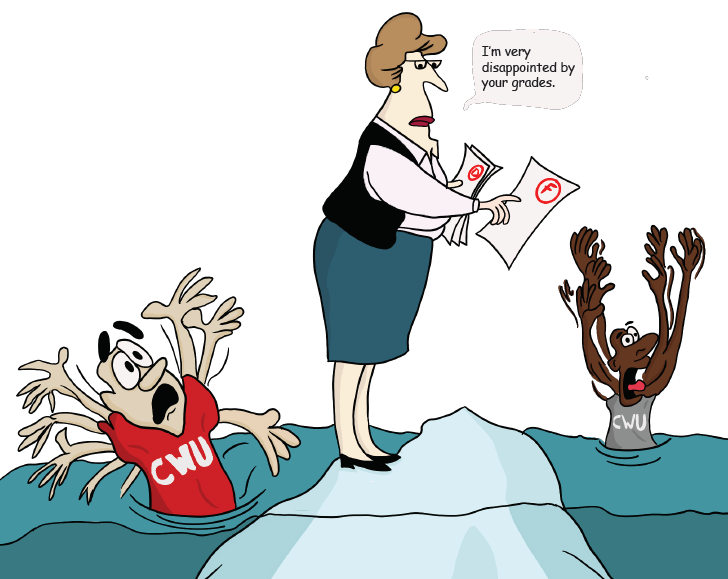ASCWU frustrated by lack of additional learning materials
April 7, 2021
ASCWU currently has a list of faculty who students have said are not providing enough learning materials in their classes.
This comes after a year of complaints from students that faculty members have not provided enough supplemental materials.
Currently, the list consists of 12 faculty members spread across all four colleges at CWU. ASCWU President Mickael Candelaria said ASCWU has previously emailed Provost Michelle DenBeste a list in February, though he said, “there wasn’t a response.”
ASCWU plans to send an additional list to administrators this week.
Currently, on the list, there are two faculty members in the College of Business, two in the College of the Sciences, four in the College of Arts and Humanities and four in the College of Education and Professional Studies. Candelaria said the list is ultimately about holding professors accountable.
“Most of the time, they honestly don’t know. And that’s what we think they found out with the first wave of names,” Candelaria said.
However, DenBeste said she has not seen the list ASCWU compiled.
“I have not ever seen the list, or know for sure that it exists,” DenBeste said. “We heard from some students who are struggling.”
DenBeste said CWU has worked to find solutions to the student complaints.
“There are some professors who are not answering emails, who are not responding, who are not as present as students would like,” DenBeste said. “We’ve been working hard to deal with that. I don’t think it’s the majority of people, but I think it’s frustrating if you’re a student in the class.”
DenBeste said there is accountability among faculty, and that CWU has had procedures in place since before the pandemic for when faculty do not fulfill their job duties. However, since it’s a personnel issue, DenBeste said “students often don’t hear what’s going on behind the scenes with that.”
“A lot does happen behind the scenes that don’t see, and shouldn’t see, because it’s private and confidential, and the wheels are moving,” DenBeste said.
In resolutions announced on March 2, ASCWU wrote that “a number of current CWU faculty have not been providing students supplemental learning aides” and “students are struggling to learn course materials without these learning aides.”
The resolution called on the office of the provost to release a statement or policy which “mandates ALL CWU faculty to provide students with recorded videos or real-time online lectures.”
Candelaria said there was hope that the university would mandate some type of lectures from faculty, though this has not happened yet.
“I know it can be a tricky situation because we were hoping for a blanket solution, but I don’t know if there really is a blanket solution to this,” Candelaria said. “It doesn’t seem like our admin is as willing and able to implement straight across the board that mandates faculty to have lectures of some sort the way that we, student government, thought they would.”
DenBeste said the request from ASCWU for professors to provide recorded lectures might not be the best practice.
“If you read about pedagogy, more and more you hear that lectures are really super old school and it’s not, it’s not the best way to do things whether we’re in class or online,” DenBeste said.
The idea behind having more asynchronous classes with fewer lectures is to provide students with more flexibility, DenBeste said.
“The consensus in education world is that it would really be better to do more asynchronous so that students who had jobs or families or things that had changed because of the pandemic would still be able to get their classwork done,” DenBeste said. “It turns out that, at least at Central, a lot of students really, really, really dislike the asynchronous classes, so we’re doing fewer of them.”
Another one of ASCWU’s frustrations is that CWU was not using student evaluations over the past year in the faculty review process, though this has changed for the spring quarter.
“Their [student evaluations] weren’t being taken for faculty review, but students were still being graded,” Candelaria said. “So, it was kind of like they were holding students accountable but not their faculty to that same level. So that’s kind of why student government is frustrated, and we know the student body is frustrated.”
DenBeste said part of the issue is that most students don’t fill out these evaluations at all.
“Students were kind of irritated because we were counting student evaluations for professors differently right now because professors are experiencing COVID as well,” DenBeste said. “Very few students fill them out. Percentage-wise, the return rate is very low. So, I would really encourage students to do that, COVID or otherwise.”




Dave • Apr 8, 2021 at 8:17 am
CWU Needs to learn how to take accountability and quit trying to say things. Their lack of effort is partly due to the lack of participation from students or just refusing to take action because there is no easy way to do it. If the ASCWU is expressing frustration, they are speaking for the entire body of CWU students, and the higherups need to start taking accountability. In the Fall quarter, when asked about the situation like what is happening now, both President Gaudino and DenBeste both said to let departments and higher up know of these issues, and it will be addressed. Clearly, what was said back in the Fall is not being used today. A person like DenBeste should acknowledge that while professors are experiencing COVID like students, the difference here is students are paying to do it, and professors are being paid.